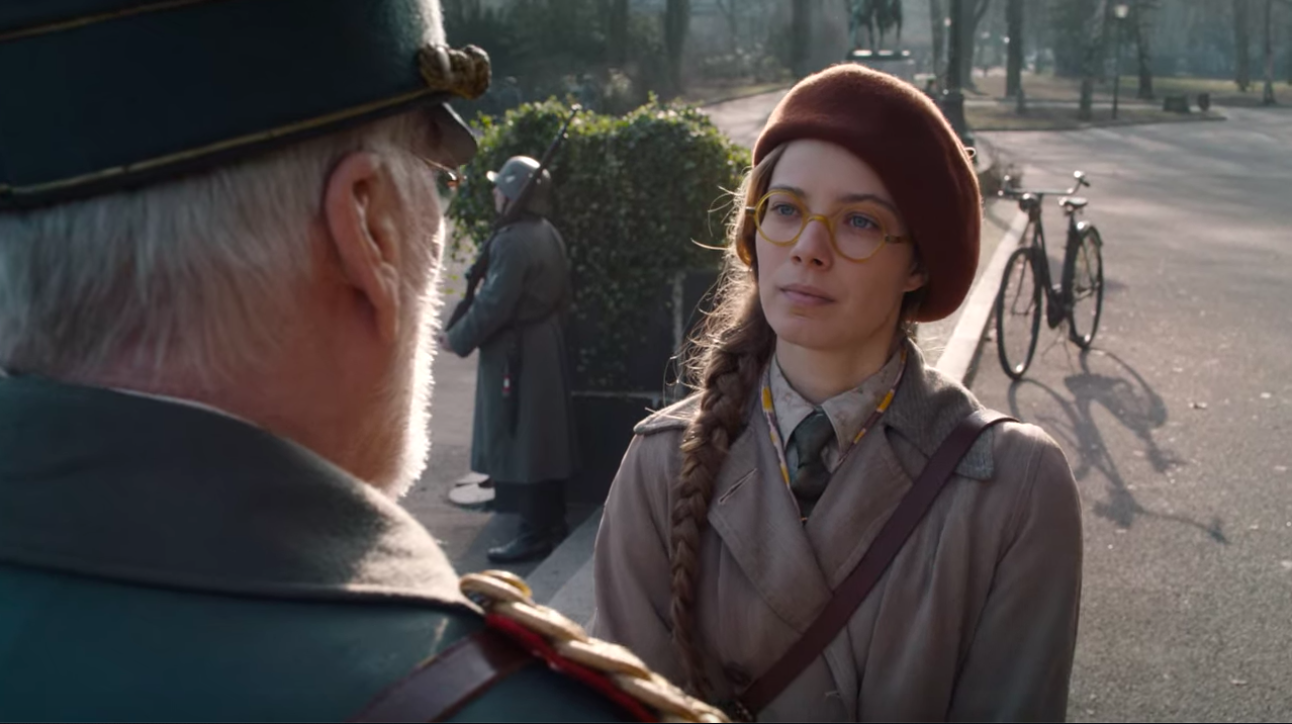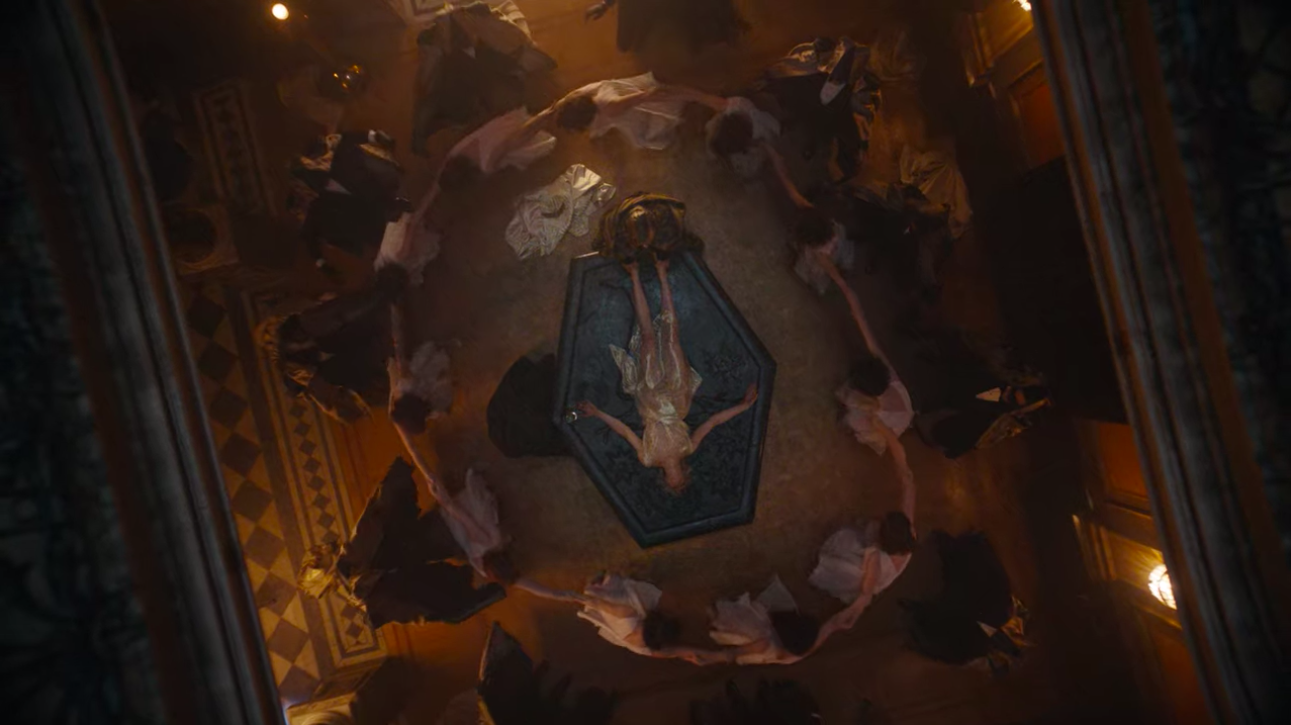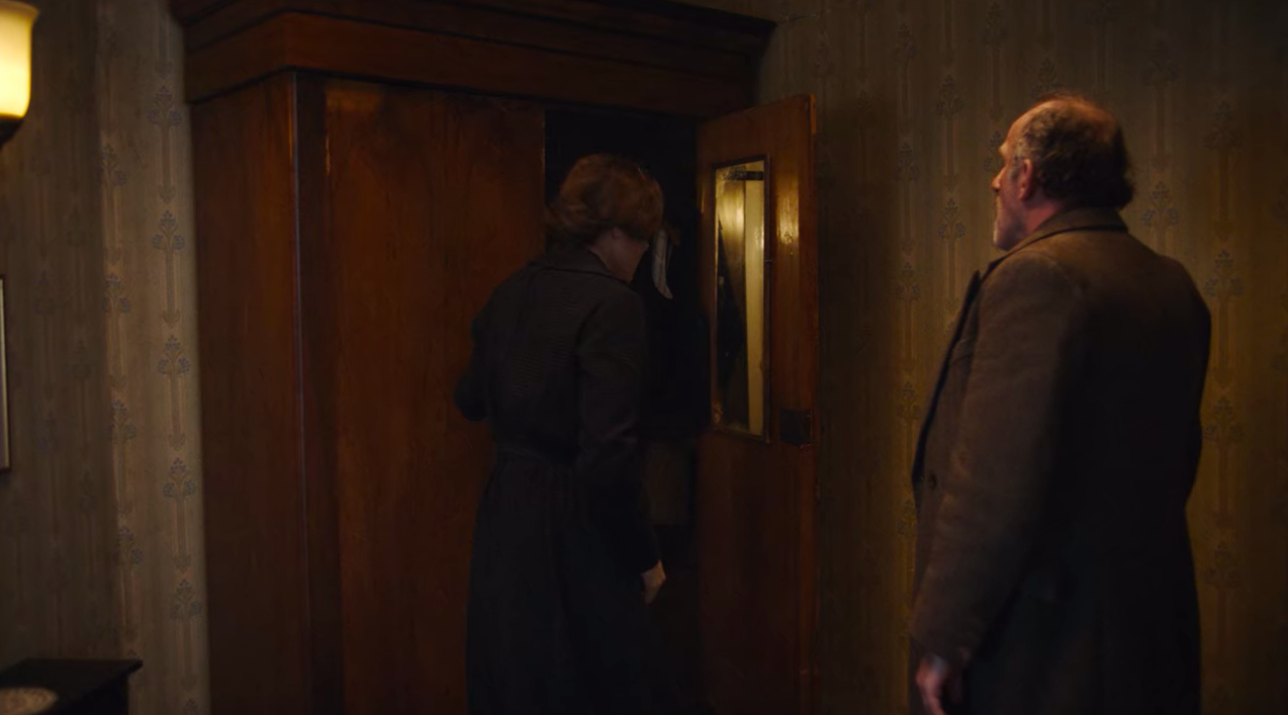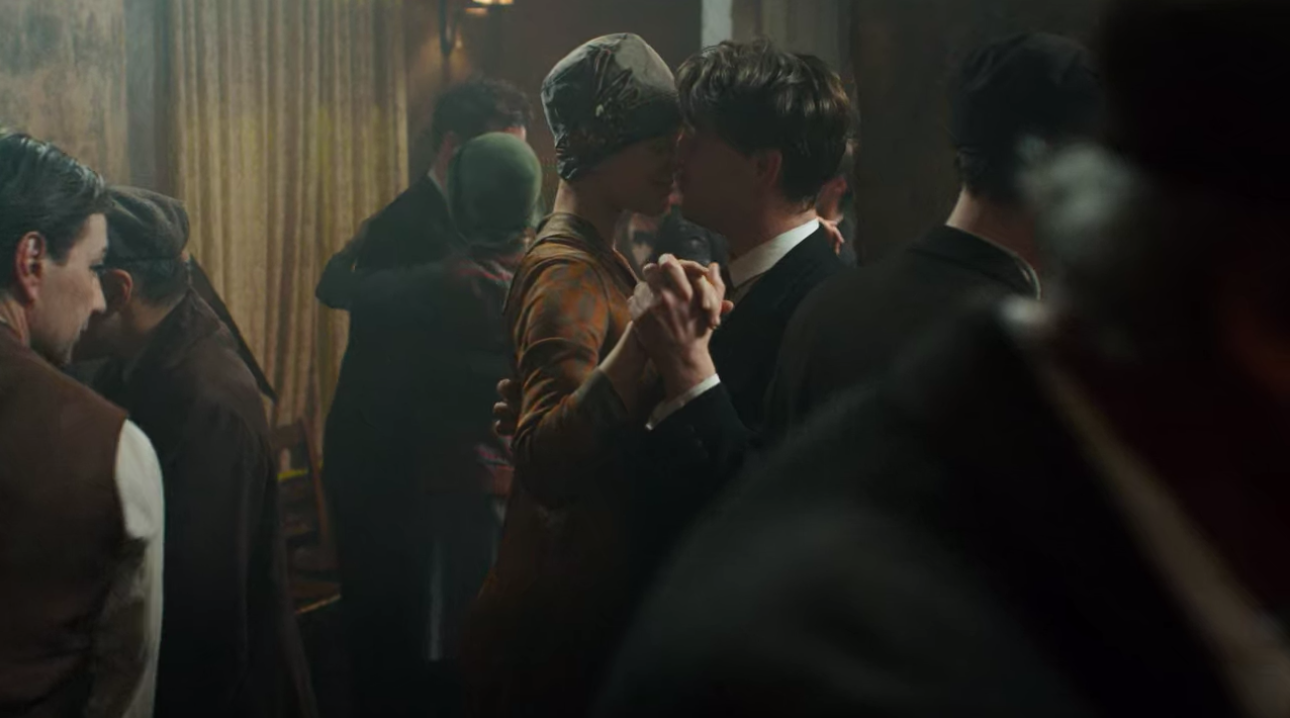Babylon Berlin: "Episode 21" and "Episode 22"
In which everything gets about 15 percent more Twin Peaks

(For the foreseeable future — aka as long as this quarantine lasts — Emily will be watching the critically acclaimed German drama Babylon Berlin, a neo-noir set in 1929 Germany. The series is available on Netflix in the United States. For every installment, she will be joined by a special guest. Today’s guest is TV critic and costuming aficionado Emma Fraser, who previously joined Emily for “Episode 5” and “Episode 6.” Find Emma on the internet on Twitter and at her website.)

Emily: One thing I love about Babylon Berlin is the way that it’s this very somber historical drama about the rise of the Nazis smashed up against a wild crime caper straight out of Twin Peaks. It really shouldn’t work. These tones shouldn’t balance each other out. Somehow, they do.
In watching these two episodes — which might be the most tonally disparate installments of the series yet — I started wondering if Lotte is the bridge that holds the show together. When Gereon starts looking into Greta’s conviction, for instance, he remains, more or less, in Twin Peaks world, where he investigates German expressionist murders, has to decide whether he wants to be seated with “swimmers” or “nonswimmers,” and has to wonder how deeply he’s been brainwashed. Greta, by contrast, is over in somber historical drama territory, which is why her scenes can sometimes feel like a drag.
But Lotte can move between these two worlds easily, and, perhaps more importantly, her behavior and demeanor shift depending on which version of the show she finds herself in. She’s equally at home crashing a cult ceremony and licking Gereon’s tongue and dealing with the domestic strife of realizing her new romantic partner is maybe covering up something truly awful. She’s unflappable, and maybe being unflappable is what is needed at this point in history.
A lot happens in these two episodes, enough that I’m vaguely surprised to know there are six more episodes to go, including a finale that’s longer than any other episode the series has done. And yet, these two installments feel, for all the world, like new season premieres, given how many situations and characters they introduce, like General Seegers’s Communist daughter, Malu, who feel like they’re going to be significant going forward.
I still don’t have any idea where this season is going, but unlike last week, I feel happy about that fact. I can’t wait to get to the end; I am totally fine getting lost in whatever is happening this season. Emma, how do you feel about the show’s wild tonal swings? And wasn’t it the cutest when Vera fluffed her hair a little before Lotte stepped into their flat?

Emma: I think this season particularly leans into the duality that was plaguing Berlin at the time, even more so than the scenes at Moka Efti from the first season. I really love the notion that Gereon is in this Twin Peaks style world, in which he runs into his brother at secret seances while in the middle of a murder investigation. He assimilates to these new surroundings with ease so when Charlotte tells him to stick his tongue out, he does so without hesitation — does this count as their first kiss? Meanwhile, Böhm is aghast at the whole situation and can barely disguise his disgust at having to participate in the charade.
Charlotte's ability to move between social groups and roles is why I don't even question that she knew someone who was working the occult gig, because of course, she did. If there are some underground night shenanigans, Lotte will have the connection.
One thing that does get lost in not knowing the language is how dialect and accent factor in, we know Gereon is stiffer as a person because of where he is from and his family status but that isn't always obvious when reading subtitles. A friend found this interesting post on Reddit, which notes how Charlotte switches her use of language depending on who she is talking to, whereas Gereon always uses the formal pronouns — even when he is angry. She adapts, whereas he is pretty set in his ways when it comes to his speech (unless a cape gets thrown on him, and then he is game). All of this makes sense and it isn't surprising she does this, but having this extra information is handy at reinforcing how we view her.
Hitting the halfway point there are still so many plates spinning, which makes it feel like a big swing that they are introducing new characters at this stage. At the moment there are five different stories going on, but this show is very good at weaving those threads (I am using way too many metaphors) together. Horst is a good example of this as he was introduced via Greta's arc. But now he is taking part in the Katelbach hunt (while Gereon looks for him), he has his own romantic drama, and he is involved in the camp Moritz is desperate to attend — sidenote I know you mentioned this already but I would be remiss if I didn't acknowledge his Henry Jennings-like growth spurt and what a nightmare it must be for continuity when casting tweens and teens.
Because I watched this season in a day (I didn't plan on this, it just happened), rewatching these episodes made me appreciate just how well plotted this season is and I definitely noticed more this time. You mention the General's daughter and she is another character who is straddling two different worlds, not only in her politics but also in how she pops into Charlotte's storyline too.
Vera's excitement at Lotte coming home with the hair gesture proves this isn't an act and she looks so happy when the prospect of getting "fresh air" is raised. Sadly Lotte has bigger things on her mind, and smooching doesn't factor. Instead, Vera reveals something pretty damning. I will say that even though I am very much about the Charlotte/Gereon of it all (despite how messy it could be), I like Charlotte and Vera as a pairing — even if there have been some truths withheld.
As far as the wild tonal swings go, it is one of the reasons I find Babylon Berlin so enrapturing because one minute it is a mini Expressionist movie, the next it seems to be heading toward Eyes Wide Shut and then it turns into a spy thriller. There's this idea that Berlin was both mythical and modern as a society and in the filmmaking that was taking place at the time, which is how these episodes felt to me. What did you make of the seance sequence and how it fits into this season? Gereon bounds up to his brother like a puppy dog and it does call into question how much power Anno (sorry, Dr. Schmidt) has over the detective.
Emily: Wow, that seance was wild. I want you to do some fashion critique of those capes, but most of all, the sequence reaffirmed my believe that I should not be taking Dr. Schmidt at his word that he is Gereon’s brother — if indeed he ever said that at all. Perhaps Gereon just hallucinated it? The degree to which we never understand where we stand with our main character is emblematic of the fraying of Berlin you just talked about. In some ways, Gereon is more of a symbol than a character, but being more of a symbol than a character is kind of what this show needs at its center. Give Charlotte the meaty personal complications.
My favorite thing about the seance is the degree to which the season hinges on it, while also seeming as if it’s not important to the larger picture at all. It feels like the place where we’re going to get at least some of the answers. And instead, we get what seems like a deeply sad ritual to resurrect a woman who died too soon. (For some reason, I’m now also questioning whether Betty is actually dead, despite having had a spotlight dropped on her.) One thing about this show is the degree to which everybody but Charlotte is haunted by something in their past, a visceral reminder of the way that fascism played off ill-founded nostalgia to achieve its goals.
One other thing that frequently floors me about this series is the way in which it’s so patient, something that seems unlikely in a show with five different plots spinning all at the same time. But we’re at the middle of the third season, and we just got our first glimpse of Hitler (in a photograph in “Otto’s” apartment). Talking about the Nazis is more common this season, and we’re seeing more of those swastika armbands. But the show is becoming bolder about letting us see what lurks over the horizon.
There is something to the idea of there being big money behind the Nazis, in the form of rich backers who think they can control the chaos once they unleash it that really appeals to me. And there’s something to it that feels way, way too neat. Yes, typically, fascism rises in tandem with moneyed interests, and yes, typically, it slips loose from the leash the money folks think they have on it. (We’re seeing this with the rapid radicalization of our own Republican party here in the US.) But there’s something so clean about the idea that this tiny group of conspirators is behind everything bad that’s about to happen, even if the show is surely doing something more interesting with it.
Speaking of those conspirators, though, I think one of the reasons the Helga stuff remains stubbornly uninteresting to me is that Helga is a symbol whose primary connection to the rest of the series is as another symbol. She’s pregnant, apparently, and she’s forbidding Moritz to go out into the woods (something Gereon will likely allow so he can tag along). But she’s mostly here to symbolize the Life Gereon Will Never Lead, and on that front, she’s kind of dull.
How do you feel about Helga right now? And what do you think of Greta’s slow evolution into someone who smirks at death?

Emma: Even watching a second time, my reaction to the theatrics of the seance, from the password to the mask and capes being dished out upon arrival, was one of joy, because it’s so wonderfully over the top. The event itself is a sad affair, but the initial room with the flaming centerpieces was exactly what I was hoping for. If the killer's costume on the film set is the crude angular version, these are textured garments are couture. If I was Charlotte, I would be figuring out how to sneak it out of there in the midst of the arrest and where to stash it in her apartment. Who needs bedsheets when you can wrap yourself in this?
The interesting thing with Gereon in this pair of episodes is how all over the place he is both professionally and personally. Sure, he is normally all over the place, but here he is fraying at the edges (and this without the drugs). Böhm is far more by the book and rigid in his methods — something Bruno definitely wasn't — which makes Gereon the loose canon so to speak. Katelbach gives him grief for lying in court, but is grateful for his former roommate’s (perfectly timed) warning. He is in a fight of sorts with Charlotte thanks to his somewhat cold assessment that Greta is a murderer – technically she is but there are mitigating circumstances that he is more than aware of. He tells her about the Red Aid legal option, but the damage is done, and in return Charlotte lets out the Helga secret. So much for the paternoster flirty banter earlier, in which they managed to have a morning after conversation avoiding all tongue chat but still crackling with tension. And the thing is, Gereon is still investigating who was behind Benda's death so he could've told Charlotte rather than the semantics argument he opted for. Dude sure knows how to self-sabotage a good thing.
The Helga storyline is a major downer because it further reinforces what a bad idea it was for her to come to Berlin in the same place. Of course, Moritz seems to be enjoying himself, but she is never going to get the rom-com version of their relationship that includes whimsical dancing before breakfast or even sloppy drunk swaying in a bar. Her letter to Gereon says all it needs to — the bleary eyed comment is harsh but fair and shout out to the makeup team for the work on those under-eye bags – and it is frustrating that the writers have thrown the cliche pregnancy dilemma into the mix.
It also feels like Gereon is going through the jealousy motions in hunting her down at the hotel (and abusing his police credentials). Moritz is happy to see him because who wouldn't love to see the parental figure who buys you beer and says it is okay to go on the Jojo Rabbit camp (this is all I can think of when the issue is raised and I am sorry). Alfred alludes to the fact that he can help her get agency but isn't this another man just swooping in to save the day? Helga frustrates me and I want more for her, but I don't know how the show can achieve this.
One character who did get to do something outside of her comfort zone was Elisabeth and I couldn't be more thrilled to see her use her smarts in the apartment with the wardrobe trick, and in her ability to lose Fritz by switching buses not once but twice. Her smile when she realized her plan had worked was incredibly satisfying, as was her insistence that Katelbach's editor answer with the right coded phrase before she gave up the document. I also appreciated Katelbach's response when she mentioned she had read and agreed with his work (it is always nice to be told this).
The growing discontent against those we will know will take power is notable. I was going to mention the Hitler photo as I thought this was the first time his image had been used and the influence of his party is ramping up (even if they are seen as little more than thugs for the rich to wield). It must be hard not to lean too heavily into this aspect, and the show does a good job of showing it was gradual rather than all at once. The powerful men who don't really give a shit about the ideology is one of the not so subtle moves and you're right that this is something we are sadly all-too familiar with.
Greta's journey this season is even more upsetting than last and it feels like she is resigned to her fate. What is more interesting to me is who her new bunkmate is. The good Dr. Völker has been on the edges so far and I think this pairing, while convenient, is an ideal way of keeping this character around. I watched the first season of Dark this week on Netflix and the actress who plays Völker is also in this, but it took me an episode to figure this out without her signature braid and the 1920s setting.
What did you make of Elisabeth earning her spy stripes? And how did you feel about the way the press is featuring this season?
Emily: Elisabeth?? More like Elizabeth Jennings!!!?
The ol’ “hide your renter in a spare room you cover up with a wardrobe, so he can escape” trick turns out to be a masterstroke, and I was struck by the way it uses the idea of hiding someone away, something that will become far too common with the arrival of the Holocaust, almost as an exciting moment out of a thriller. It’s even almost funny as Elisabeth forces Katelbach into that wardrobe, especially when it pairs with the scenes earlier in the episode where he tried to flirt with her (and failed miserably).
The treatment of the press in this season has been truly fascinating. Reporters are presented as heroes, to some degree, but also as easily distracted goofs, who can never truly change anything. Katelbach’s report on the rearming of the Luftwaffe, for instance, will accomplish precisely nothing, we know, even if it sees publication. And it’s almost bumped in favor of a Betty Winter story! The photographers that mob all of the wrong events, missing the real story lurking beneath everything else, feel like the sort of monolithic force that represent the difficulty of creating real change — there’s always some wall standing in your way.
And yet… the Nazis still focus special attention on the press, breaking in and terrorizing the reporters and editors who stand in their way. This isn’t a show about the press being intimidated, not really, but it is about how hard it can be to do your work as a reporter when you are being persecuted for doing that work. As season three winds along, more and more Berlin institutions are being dragged into the storytelling — the presence of Malu and her boss suggests that the legal system will be even more, and now we have actual storylines set in newspaper offices. This is a show about blindspots on some level, and it’s necessary to see how these institutions have massive blind spots of their own.
It’s really hard for me to properly evaluate this season not knowing where all of this is going. But after this episode, it seems clear to me that it’s going somewhere.
Emma, before you go, please tell me more about Lotte’s hats. Did you notice the one scene where every woman seemed to be in her famous green hat from the premiere? I loved that.

Emma: Even the most basic spycraft makes me a little giddy, and Elisabeth certainly knows a trick or two. The wardrobe method does read as foreshadowing, and this idea of figuring out where to hide when you can't flee the city is a novelty right now, but it will soon become a method many will use to survive.
One of the best scenes in The Post is when you see how the newspaper is physically put together and I love anything that reveals the nuts and bolts of how things get made (see also the Little Women book binding sequence). This newspaper layout meeting is one such moment, and I get all romantic when it comes to this side of our job (maybe because most my work has been online). The fact that the Betty Winter story almost takes front page isn't a surprise because this is the double whammy of "if it bleeds it leads" and the celebrity angle, and I find it so fascinating that a movie is at the center of this season's mystery, even if it takes a backseat in these two episodes. My beloved Gräf also took a backseat during these episodes (a brief scene with Gereon aside), so my one regret is I don't get to talk about his arc this season.
What we do get is a meeting of the five families (or the Berlin equivalent). I don't know if I care all that much about the inner workings of this set-up because I watched all of Boardwalk Empire and I don't need Babylon Berlin to become that. Not that I think it will — I guess they need the Edgar scenes to remind the audience and these other gangs that he is in charge (even though he seems to be losing his grip). His wife Esther, wears some glorious high waisted pants in Episode 6 and also tries to prove her worth by rewriting the movie to work around Betty Winter's murder. Part of her solution is to cast herself – her look is similar – but this is instantly dismissed because it would be too dangerous. The scene was brief, but the screening room showed just how much the footage looks like a lot of the Expressionist movies of the period. It is also no coincidence that the concept of using a machine as a substitute for a person is suggested – the machine man is part of the Metropolis plot.
One other costume I want to shout out before moving onto the all important Charlotte hat chat is Malu's beret, beige double breasted coat and leather satchel evokes a Wes Anderson mood (even if this look existed long before Moonrise Kingdom). She's self assured down to how she dresses and part of her privileged position is she can OK, Boomer ("You sound as boring as my dad" is a 1929 burn) Wendt at the dinner without having to worry about repercussions. Nevertheless, she is using her limited power for good by working with Hans Litten (a real-life figure who has a hell of a backstory and more people should know who he is).
So the scene of many Charlotte green hats is fascinating not only because of how this shade stands out in the local pub Gereon frequents, but it is a scene focusing on his future (or lack of) with Helga. Here Moritz gives his uncle a breakup letter and throughout this chat, women wearing Charlotte's signature cloche from season one dance around him. She has since switched to darker headwear because she no longer needs to stand out in the crowd to scramble for secretarial work (even if Böhm still sees her as nothing more than a stenographer).
At this point in the season it does feel like the pieces are moving into place, and without saying too much, this is probably my favorite of the three we've had so far. I am excited for what you have to come!
Emily: So am I! Emma, thanks for dropping by again. Where can the people find your work?
Emma: Thanks for having me back! This has been a delight once again. You can find me as ever on Twitter (my current cover photo features a familiar face). Last time I mentioned some forthcoming Babylon Berlin pieces, which are now out! This one explores the genre-bending aspects of the series with a focus on horror, and I make the case as to why people should watch (there are light season three spoilers, including photos). The capes make an appearance, if anyone is interested. And I also took a broader look at the horror and sci-fi German Expressionist movies of the 1920s and talked about why they are relevant nearly 100 years later (the images for this one are also stunning).
Emily: And I’ll see you, lovely readers, next week, when we tackle “Episode 23” and “Episode 24”! We’re getting so close to the end!




